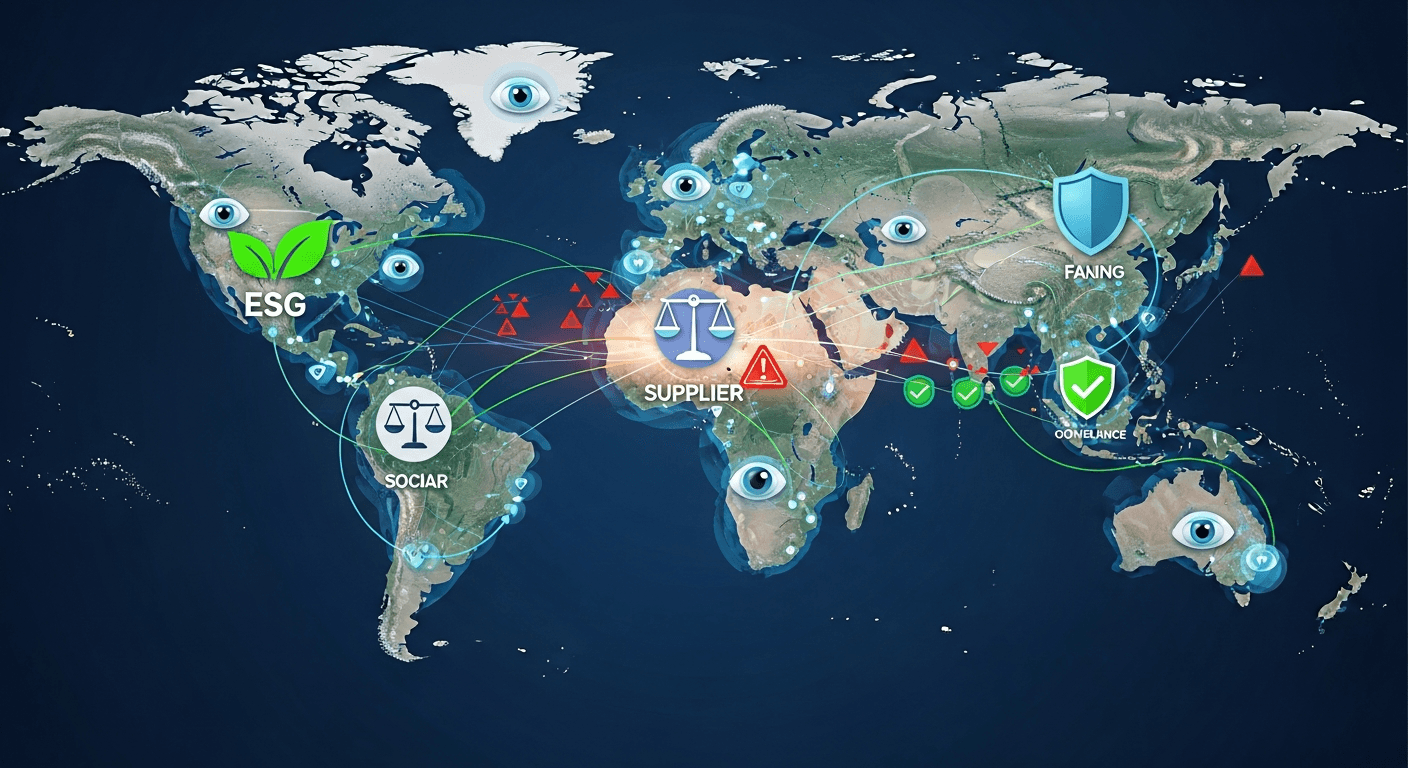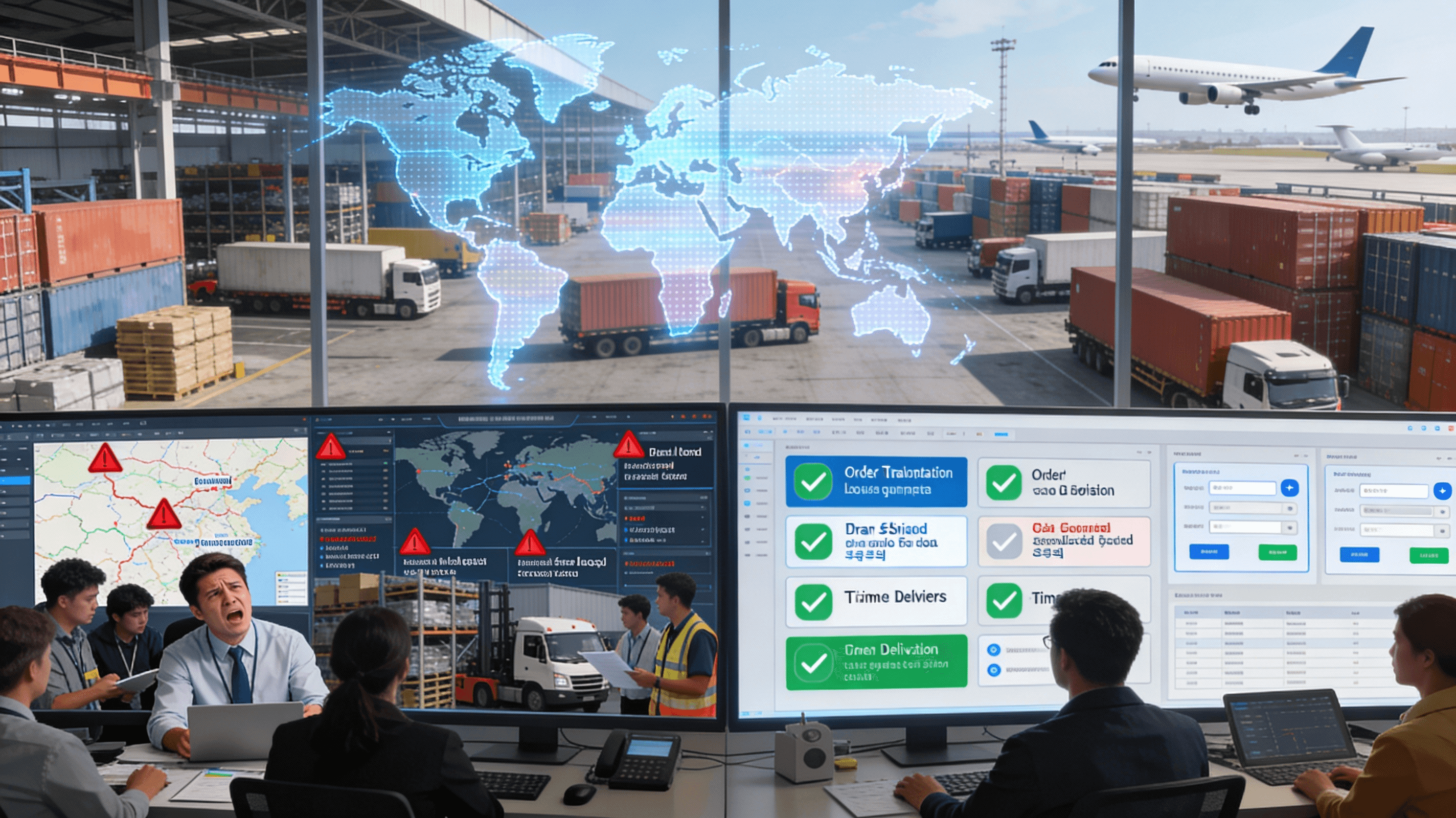Ethical Sourcing AI: Automated Supplier ESG Compliance Auditing
Thursday, 30 Oct 2025
|
Introduction: Ensuring Integrity in Global Supply Chains
Supplier non-compliance with ESG standards exposes logistics firms to reputational risks, fines averaging $500K per violation, and disrupted operations, with 60% of global networks facing ethical sourcing gaps due to manual auditing limitations. AI agents automate compliance auditing by continuously monitoring ESG factors, assessing risks in real-time, and evaluating suppliers against benchmarks, enabling responsible sourcing that recovers 25% more value from ethical partnerships. These systems ingest data from public records, satellite imagery, and ERP feeds to flag issues like labor violations or environmental breaches across borders.
For procurement directors, CSR officers, and supply chain executives, automated intelligence transforms auditing from a reactive chore into a proactive strategy, aligning with regulations like the German Supply Chain Act while enhancing supplier quality. This guide covers AI's role in ethical sourcing, from monitoring mechanisms to evaluation frameworks, offering implementation insights and metrics for success in global networks. As 85% of investors scrutinize ESG performance, AI-driven auditing is crucial for sustainable, resilient sourcing.
Challenges in Traditional Supplier Compliance Auditing
Manual audits in global networks are infrequent and resource-intensive, covering only 20% of suppliers annually and missing dynamic risks like geopolitical shifts that impact 40% of ethical compliance. Data silos across vendors hinder holistic views, leading to undetected issues such as child labor in tier-2 suppliers, which affect 15% of electronics chains. Regulatory divergence—e.g., EU vs. U.S. standards—complicates evaluations, with non-compliance costing firms 5-10% in lost contracts.
Reactive approaches fail to scale for vast networks, where auditing one supplier takes 100+ hours, delaying responses to emerging threats like forced labor reports. This results in supply disruptions and ethical scandals that erode trust, emphasizing the need for continuous, automated intelligence.
AI Agents: Automating Ethical Sourcing Intelligence
AI agents centralize compliance by aggregating multi-source data via APIs, applying NLP to scan news and audits for sentiment analysis on supplier ethics. Machine learning models score suppliers on ESG criteria, predicting risks with 90% accuracy based on historical patterns. Blockchain verifies audit trails, ensuring tamper-proof records for stakeholder transparency.
Multi-agent systems specialize: one monitors environmental metrics, another assesses social compliance, fostering collaborative oversight. Dashboards deliver actionable insights, alerting on score drops below thresholds like 80/100 for labor standards. This automation reduces audit cycles from months to days, covering 95% of networks proactively.
Continuous ESG Monitoring
Agents deploy real-time feeds from sources like CDP reports and satellite data to track Scope 3 emissions, flagging suppliers exceeding carbon limits by 20%. Geo-spatial analysis detects deforestation risks in sourcing regions, integrating with IoT for factory emissions. Automated alerts integrate with collaboration tools, notifying procurement on issues like water usage violations.
Frequency-based scanning—daily for high-risk suppliers—ensures ongoing vigilance, with 70% faster issue resolution than manual methods. Integration with global databases like EcoVadis enhances monitoring depth.
Risk Assessment Frameworks
Predictive models use graph analytics to map network risks, identifying cascade effects from a single supplier's ethical lapse. Scenario simulations test "what-if" disruptions, like tariff changes impacting sourcing ethics. Risk scoring incorporates variables such as regional stability indices, prioritizing audits for scores above 50/100.
Federated learning aggregates anonymized data across partners, improving assessments without compromising privacy. This yields 30% better risk mitigation, safeguarding global operations.
Supplier Evaluation and Scoring
AI evaluates suppliers via weighted algorithms: 40% environmental, 30% social, 30% governance, generating dynamic scores updated quarterly. Computer vision analyzes facility images for safety compliance, while sentiment tools review stakeholder feedback. Onboarding agents auto-vet new suppliers, rejecting 25% non-compliant early.
Benchmarking against industry peers ensures evaluations align with standards like UN Global Compact. Continuous refinement via feedback loops boosts accuracy to 92%.
Integration Strategies: Embedding AI in Sourcing Ecosystems
Link AI agents to SRM platforms like SAP Ariba for seamless data flows, using ETL tools to standardize global inputs. Cloud architectures scale for multi-tier networks, processing petabytes from diverse regions. API orchestrators connect to external validators, enriching evaluations with third-party audits.
Hybrid deployments secure sensitive data on-prem while leveraging cloud ML for analytics. Low-code customizations allow procurement teams to adjust scoring weights for industry specifics. Pilot integrations in high-risk tiers validate ROI before full rollout.
Technology Stack for Global Networks
Edge computing handles regional data latency, ensuring real-time assessments in remote areas. Secure APIs enforce compliance with data sovereignty laws like GDPR. Visualization tools like Tableau integrate for intuitive risk maps.
Partner ecosystems expand capabilities, linking to sustainability platforms for comprehensive ESG views.
Roadmap: Deploying Automated Compliance Auditing
Phase 1 (Months 1-3): Map supplier tiers and integrate core data sources, piloting monitoring on top 20% by spend. Phase 2 (Months 4-6): Roll out risk assessment and evaluation agents, training on historical audits for baseline scoring. Phase 3 (Months 7-12): Scale to full network, automating corrective actions like supplier notifications.
Ongoing: Annual model retraining and audits maintain 95% accuracy, with governance boards overseeing ethics. Initial investment of 5-8% of procurement budget yields 4x ROI in risk avoidance. Mitigate challenges like data gaps with imputation algorithms.
ROI and Case Studies: Value from Ethical Intelligence
Automated auditing delivers 250-450% ROI through 20% cost savings on compliance and 15% supplier performance uplift. Unilever's AI system audited 50K suppliers, reducing risks by 35% and enhancing ESG scores. Nike integrated agents for labor monitoring, cutting violations by 40% and boosting brand value.
These cases illustrate how continuous intelligence strengthens networks, turning compliance into a sourcing advantage.
Explore More on Debales.ai
- How AI Improves Supplier Selection and Relationship Management
- Ethical Considerations of AI in Logistics: Addressing Job Displacement
- Geopolitical Risk AI Monitoring: Real-Time Logistics Threat Tracking 2025
- In What Ways Does AI Improve Sustainability in Logistics E.g. Reducing Carbon Footprint
- Multi-Agent Orchestration: Autonomous Collaboration in Supply Chains
Secure Your Ethical Sourcing with AI
Fortify supplier compliance across your global network. Partner with Debales.ai for automated ESG auditing and risk intelligence.
Conclusion: Responsible Sourcing Through AI Excellence
AI agents enable ethical sourcing intelligence via automated auditing, continuous ESG monitoring, risk assessment, and supplier evaluation, ensuring compliance and sustainability in global networks. This approach not only mitigates risks but elevates responsible practices as a core competitive strength. Adopt AI auditing to lead in ethical supply chain management.


